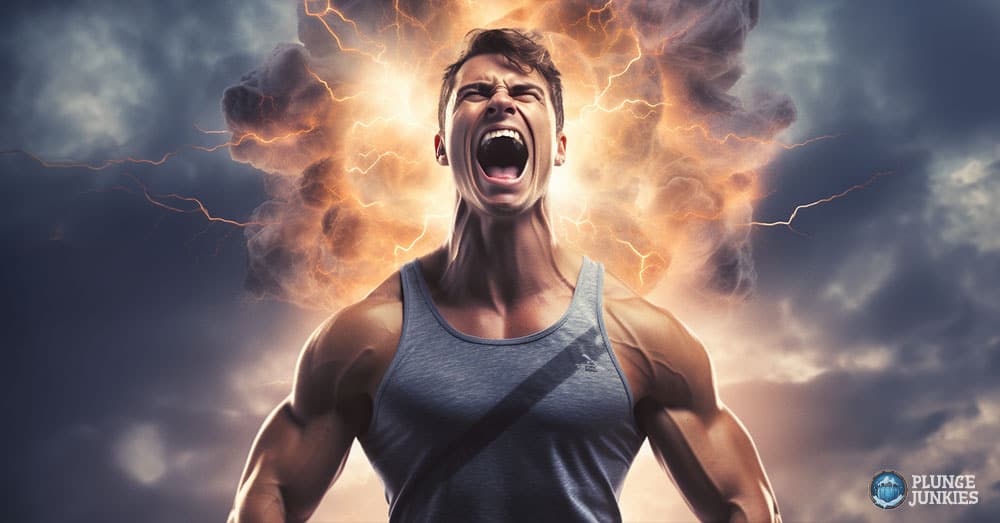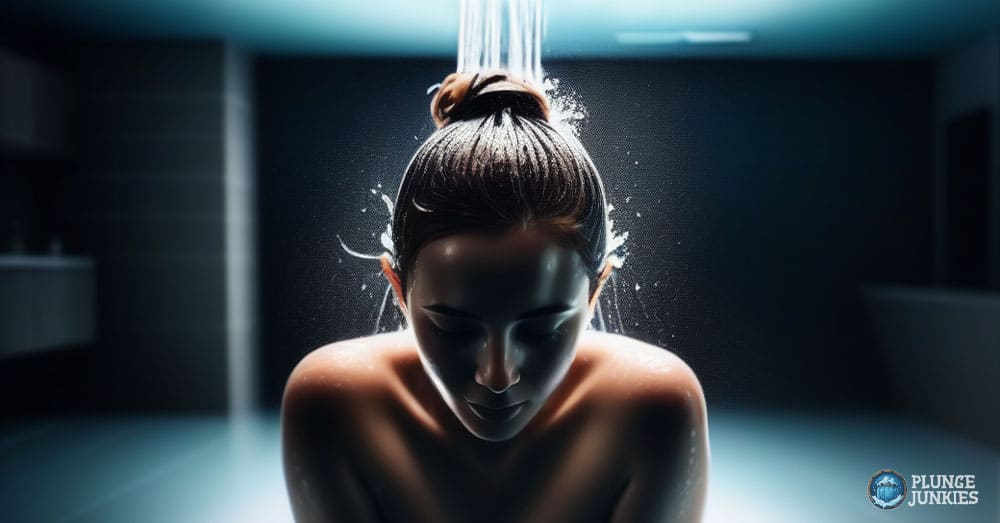Cold showers can be a potent remedy for anxiety relief, stress, and panic attacks. Millions suffer from these challenges, seeking ways to ease their symptoms and enhance their quality of life.
A simple yet effective method has emerged: cold showers. Incorporating hydrotherapy through cold water can usher in numerous benefits, addressing anxiety and panic attacks directly.
Cold showers help anxiety and panic attacks by triggering physiological responses like improved blood circulation, the release of endorphins, and reduced cortisol levels, promoting relaxation and emotional well-being.
In this article, we’ll demystify the bond between cold showers and anxiety alleviation. We’ll dive into the science and the physiological effects triggered by exposure to cold water, such as the surge of endorphins that elevate mood, a decrease in cortisol levels promoting emotional stability, and a heightened sense of mindfulness.
Furthermore, we’ll plunge into the use of cold showers as a means of aversion therapy, grounding, and breathing regulation during panic episodes. We’ll wrap up with insights on optimal cold shower timings and temperatures and their interplay with depression.
How Do Cold Showers Help Anxiety?
Cold showers offer a range of benefits for anxiety relief, providing a natural and accessible method to promote relaxation and well-being. By triggering physiological responses like improved blood circulation, the release of endorphins, and reduced cortisol levels, cold showers can positively impact anxiety symptoms.
Let’s look at 7 main ways in which cold showers can help alleviate anxiety and panic symptoms, providing a natural and effective method for promoting emotional well-being and resilience.

1. Improved Blood Circulation
Cold showers prompt the blood vessels to constrict, followed by dilation as the body tries to maintain its core temperature. This process, known as vasoconstriction and vasodilation, increases blood flow throughout the body.
Improved blood circulation can positively impact anxiety by delivering more oxygen and nutrients to tissues and organs, enhancing overall bodily function, and potentially lowering blood pressure.
By promoting better blood flow, cold showers may contribute to a reduction in anxiety symptoms.
2. Release of Endorphins
Cold showers can trigger the release of endorphins, which are neurotransmitters that act as natural painkillers and mood elevators. Endorphins interact with receptors in the brain to reduce the perception of pain and create feelings of pleasure and well-being.
The activation of endorphins during cold water exposure can help ease symptoms of depression and anxiety, promoting a sense of relaxation and calmness.
By stimulating the release of endorphins, cold showers may have a positive impact on anxiety management.
3. Reduced Cortisol Levels
Cortisol, known as the “stress hormone,” is released in response to stress and triggers the body’s fight-or-flight response. Prolonged elevated cortisol levels are associated with chronic stress and anxiety.
Cold water immersion has been shown to reduce cortisol levels, especially when used as a form of hydrotherapy.
By lowering cortisol levels, cold showers may help alleviate anxiety symptoms and contribute to an improved sense of well-being.
4. Enhanced Emotional Resilience
Regularly subjecting oneself to the discomfort of cold showers can foster emotional resilience. By choosing to endure temporary discomfort voluntarily, individuals develop mental fortitude and adaptability to stressors.
This increased emotional resilience can help individuals cope better with anxiety-inducing situations in daily life. Cold showers can serve as a form of exposure therapy, gradually desensitizing individuals to uncomfortable sensations, thereby reducing anxiety responses.
The sense of accomplishment and empowerment gained from overcoming the discomfort of cold showers can reinforce positive coping mechanisms, leading to enhanced emotional well-being and reduced anxiety.

5. Distraction and Mindfulness
The intense sensory experience of a cold shower can temporarily shift focus away from worries and fears. While under the cold water, the sensation demands attention, diverting the mind from anxious thoughts about the future or past. This distraction effect can serve as a brief respite from anxious rumination.
Additionally, the experience of a cold shower can encourage mindfulness—the practice of being fully present in the moment. Focusing on the cold water’s sensation can anchor individuals to the present, promoting relaxation and reducing anxiety.
6. Potential Anti-Inflammatory Effects
Anxiety is associated with increased inflammation in the body, and chronic inflammation can contribute to the development or exacerbation of anxiety symptoms.
Cold showers may have similar anti-inflammatory effects as ice baths used by athletes for muscle recovery and soreness. Cold exposure can modulate immune responses and decrease the production of pro-inflammatory cytokines.
By reducing inflammation, cold showers may help alleviate anxiety symptoms and contribute to a reduction in overall anxiety levels.
7. Promotion of Better Sleep Quality
Cold showers taken before bedtime can aid in improved sleep quality. The drop in body temperature after exposure to cold water signals the brain to release melatonin, a hormone responsible for regulating sleep-wake cycles.
Cold showers can help individuals fall asleep faster and experience more restful sleep. Adequate and quality sleep is crucial for managing anxiety, as sleep deprivation can exacerbate anxious feelings and impair cognitive function.
By promoting better sleep quality, cold showers can indirectly contribute to anxiety reduction.
How Do Cold Showers Help Panic Attacks?

Cold showers can help reduce the severity of panic attacks by triggering the body’s relaxation response, using aversion therapy, grounding techniques, breath control, a sense of accomplishment, distraction and redirection, and resetting the nervous system.
- Triggering the body’s relaxation response: Cold showers activate the parasympathetic nervous system, often referred to as the “rest and digest” system. This response helps counteract the sympathetic nervous system’s fight-or-flight response, bringing the body back to a state of relaxation and reducing the severity of panic attacks.
- Aversion therapy: Cold showers can be used as a form of aversion therapy for individuals who experience panic attacks in specific situations or environments. By deliberately exposing themselves to the discomfort of cold water during non-panic situations, they may reduce the association between the trigger and the panic response.
- Grounding technique: During a panic attack, individuals may experience dissociation or a feeling of being disconnected from reality. The sensation of cold water can serve as a grounding technique, helping them feel more connected to their physical body and the present moment.
- Breath control practice: Cold showers can challenge individuals to regulate their breathing while exposed to the shock of the cold water. Practicing slow and controlled breathing during the shower can translate to better breath control during panic attacks, potentially helping to reduce their intensity.
- Sense of accomplishment: Successfully enduring a cold shower during moments of anxiety or panic can create a sense of accomplishment and empowerment. This positive reinforcement may encourage individuals to face other challenging situations with increased confidence.
- Distraction and redirection: The discomfort of cold water can act as a strong sensory distraction, diverting attention away from anxious thoughts and physical symptoms. This redirection of focus may help break the cycle of panic and provide a temporary respite from distress.
- Resetting the nervous system: The sudden change in body temperature caused by a cold shower can trigger the “dive reflex” or “mammalian diving reflex.” This reflex is an automatic response that slows the heart rate and constricts blood vessels in an effort to conserve oxygen and redirect it to essential organs. This reflex may help reset the nervous system during a panic attack, potentially reducing symptoms.
In addition to the anxiety relief benefits, cold showers have other health benefits worth exploring. To learn more about the benefits of showering with cold water and its potential positive effects on overall well-being, check out this comprehensive guide on other health benefits of cold showers.
Cold Showers and Anxiety Relief Research
A study documented as “Human Physiological Responses to Water Immersion at Different Temperatures” looked at how the bodies of young men reacted when they were partially submerged in water at varying temperatures (32°C/89.6°F, 20°C/68°F, and 14°C/57.2°F).
When they were immersed in the coldest water at 14°C/57.2°F, there was a significant rise in noradrenaline by 530% and dopamine by 250%.
Noradrenaline and dopamine are brain chemicals that play a role in mood and our body’s stress reactions. They’re released by the sympathetic nervous system, which is what triggers our “fight or flight” response in stressful situations.
A surge in noradrenaline can boost alertness and attention, whereas an increase in dopamine can improve mood and motivation. Based on these observations, cold water’s effect on elevating noradrenaline and dopamine levels might offer a way to help manage anxiety or prevent panic attacks.

Another 2008 study titled “Adapted cold shower as a potential treatment for depression” suggests that adapted cold showers might have potential benefits for anxiety and panic attacks, two common mood disorders characterized by intense feelings of fear and worry.
The study explored the idea that depression could be caused by a combination of factors, including a lack of certain stressors experienced by primates over time and genetic predisposition.
The researchers proposed an approach to treat depression using adapted cold showers, where individuals gradually expose themselves to cold water (around 20 degrees Celsius) for 2-3 minutes once or twice daily.
The evidence presented in the study shows that exposure to cold activates the sympathetic nervous system and increases the levels of beta-endorphin and noradrenaline, which may have an anti-depressive effect.
Since anxiety and panic attacks also involve changes in the sympathetic nervous system and neurotransmitter levels, it is plausible to consider that adapted cold showers might have some positive effects on these conditions too.
Best Time and Temperature Cold Shower for Anxiety?
When it comes to using cold showers to help with anxiety and panic attacks, there is no one-size-fits-all answer for the best time and temperature. However, some general guidelines can be considered:
- Temperature: Studies indicate that cold water at 14°C/57.2°F can boost mood-regulating chemicals like noradrenaline and dopamine.
- Duration: Typically, 2-3 minutes of cold exposure, once or twice daily, triggers the desired stress response.
- Timing: While some find morning showers energizing, others might prefer them at night for better sleep. Test various times to determine your best fit.
- Frequency: Daily cold showers work for some, but others might reserve them for anxiety peaks. Listen to your body.
Do Cold Showers Help Depression?

Cold showers can be beneficial in managing depression due to their potential to boost dopamine levels, which in turn can uplift mood and decrease stress. Similarly, the effects of cold showers on anxiety mirror their positive impact on depression. This is because exposure to cold water stimulates the sympathetic nervous system, increasing the release of norepinephrine, which can combat feelings of stress and anxiety.
Embracing cold showers as an avenue to improve mental health can be advantageous, especially for those grappling with depression. However, it’s essential to approach this with mindfulness, recognizing that everyone’s experience may differ.
While many attest to the mood-elevating properties of cold showers through endorphin release, there are individuals with depression who might find cold exposure more distressing.
As depression is complex, individualized strategies are key. If cold showers help depression in your experience, they could serve as a natural adjunct to support your mental well-being.
Final Thoughts
Cold showers can be a potent tool for anxiety relief, especially for those grappling with panic attacks and stress. Immersing oneself in cold water, or what is known as hydrotherapy, has long been recognized for its potential to elevate mood and improve emotional stability.
When subjected to cold water therapy, the body elicits several physiological reactions, including enhanced blood flow, the secretion of mood-boosting endorphins, and a decline in cortisol levels. These changes collectively contribute to relaxation and the alleviation of anxiety. During panic incidents, cold showers can serve as a grounding measure, helping individuals regulate their breathing and navigate the intensity of the moment.
It’s pivotal to understand that mental well-being is intricate and varies from person to person. While some might derive a sense of achievement from cold showers, others could perceive it as distressing. Hence, it’s vital to be mindful when using this method and to consult healthcare professionals when necessary.
In conclusion, the association between cold showers and anxiety alleviation is intriguing and could be a useful resource for many. Pay heed to your body’s signals, discover your optimal strategies, and integrate cold showers into a comprehensive approach to emotional health.







